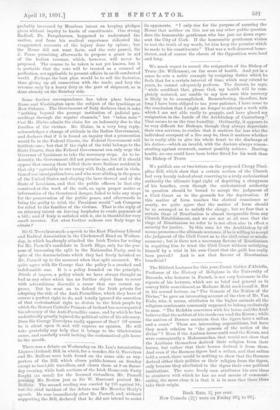We publish one or two letters on the proposed Clergy
Disci- pline Bill, which show that a certain section of the Church feel very keenly indeed about reserving to a truly ecclesiastical authority the ultimate legal right of depriving a clergyman of his benefice, even though the ecclesiastical authority in question should be bound to accept the judgment of a Civil Court as to the grounds for the deprivation. If this matter pf form touches the clerical conscience so nearly, we quite agree that the matter of form should be so arranged as to satisfy the clergy ; but we fear that a certain tinge of Erastianism is almost inseparable from any Church Establishment, and we are not at all sure that the tinge of Erastianism we refer to is not often also in effect a security for justice. In this case, let the Archbishop by all means pronounce the ultimate sentence, if he is willing to accept the judgment of the Civil Court as to the civil crime or misde- meanour; but is there not a necessary flavour of Erastianism in requiring him to trust the Civil Court without satisfying himself by a trial in his own Court that the guilt has really been proved P And is not that flavour of Erastianism beneficial P


































 Previous page
Previous page